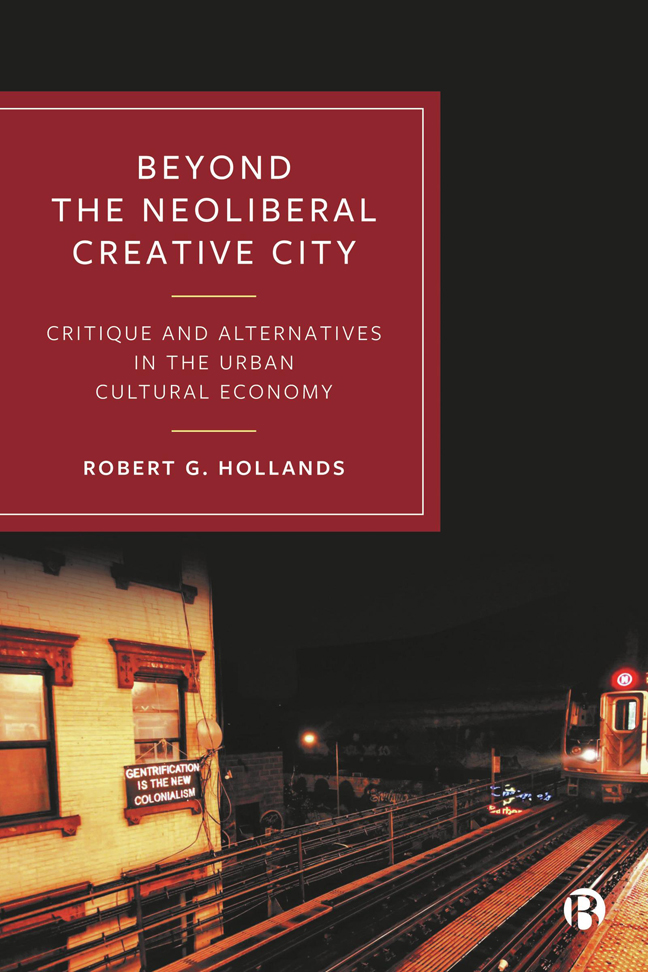Book contents
- Frontmatter
- Dedication
- Contents
- List of Figures, Tables and Case Studies
- About the Author
- Preface
- 1 Neoliberalism, Creativity and Cities
- 2 Urban Entrepreneurialism: The Emergence of the Cultural Economy
- 3 Critiquing the Neoliberal Creative City: But Long Live Alternative Creative Spaces!
- 4 Urban Cultural Movements and Anti-Creative Struggles
- 5 Neoliberal Nightlife and its Alternatives
- 6 Rethinking the Tourist City: Contestation and Alternative Cultural Tourism
- 7 Creative Polarization, Division and Exclusion
- 8 Beyond the Neoliberal Creative City
- Notes
- References
- Index
1 - Neoliberalism, Creativity and Cities
Published online by Cambridge University Press: 25 January 2024
- Frontmatter
- Dedication
- Contents
- List of Figures, Tables and Case Studies
- About the Author
- Preface
- 1 Neoliberalism, Creativity and Cities
- 2 Urban Entrepreneurialism: The Emergence of the Cultural Economy
- 3 Critiquing the Neoliberal Creative City: But Long Live Alternative Creative Spaces!
- 4 Urban Cultural Movements and Anti-Creative Struggles
- 5 Neoliberal Nightlife and its Alternatives
- 6 Rethinking the Tourist City: Contestation and Alternative Cultural Tourism
- 7 Creative Polarization, Division and Exclusion
- 8 Beyond the Neoliberal Creative City
- Notes
- References
- Index
Summary
The development of the creative economy has been heralded as the saviour of the modern city. Urban centres today appear to be more pleasant and vibrant places to live, work and play. What could possibly be wrong with having a strong cultural economy, lots of arts and culture, a vibrant nightlife and a healthy tourism trade? Who doesn't want to live in a creative city? It appears counter-intuitive to argue against urban creativity. In fact, cities not progressing in this direction can be constructed as culturally deficient (Evans, 2017: 315), creatively underdeveloped (Jesus et al, 2020) or simply as ‘crap’ places to live (Jordison, 2003).
As the World Atlas (2022a) website, ‘The World's Most Creative Cities’, says: ‘When creativity is allowed to blossom, the benefits can be endless. … As a city's creative sectors grow, so too does its overall economic standing, bringing growth to a variety of industries’. Over the last couple of decades many cities and their urban authorities around the globe have been busy highlighting aspects of their cultural economy through reference to iconic buildings, arts and culture, tourism and nightlife. They have also been jockeying for position in the creativity stakes. As O’Connor (2022: 78) puts it: ‘Culture's high-touch, high-care, jobs rich nature has been squeezed into an efficiency-maximising, profit driven, winner-takes-all competitive pyramid model.’ It is this competitive and almost entirely positive view of urban development that is encapsulated in the idea of the ‘neoliberal creative city’.
Yet underneath this creative ‘rat race’ lie a series of seemingly intractable urban problems such as widening inequalities, gentrification, job precarity and environmental concerns. Ironically, many of these problematic issues are directly connected to this overwhelming desire of cities to become ‘creative hotspots’. The impact of COVID-19 on urban life, and the not so recent climate crisis, have also raised serious questions about how well market economies based on culture and consumption meet basic societal needs in areas like health, welfare, community solidarity, well-being and environmental sustainability.
After decades of enacting urban regeneration strategies based around the cultural economy have the shortcomings of this model finally been exposed (Whiting et al, 2022)?
- Type
- Chapter
- Information
- Beyond the Neoliberal Creative CityCritique and Alternatives in the Urban Cultural Economy, pp. 1 - 23Publisher: Bristol University PressPrint publication year: 2023

